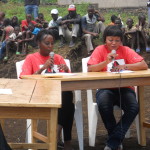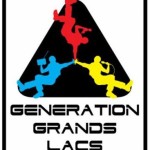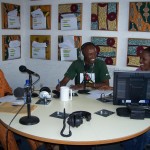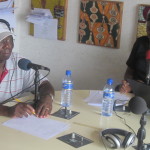Being the Bridge: Interviews with Youth Entrepreneurs in Rural Rwanda
By Katherine Conway
“I have always liked to be the bridge between the vulnerable people and those who can make decisions.”
Unaccustomed to being the one interviewed, journalist Aline Umutesi, shared with me the inspiration that drives her work. Aline, originally from the Northern province of Rwanda, joined Search for Common Ground in March 2012 to coordinate the Kura Wikorera radio program – a program that focuses on sharing success stories from entrepreneurial youth. She draws her inspiration from wanting to make the voices of youth heard, especially youth who are marginalized in rural areas and lack economic opportunities. Aline described to me how young people see the radio as a powerful tool that helps them share stories of how they can create their own livelihoods.
For Aline, journalism is a way to share stories and inspire people to take their lives into their own hands.
During my first week in Rwanda, I had the opportunity to accompany Aline on a field visit to interview youth who had successfully started cooperatives in the northern province of Rwanda. The program Kura Wikorera, which means “grow up as you create your own job” focuses on youth entrepreneurship – through helping young people escape unemployment. Aline finds the program inspirational because it shifts the mindset of youth so that they can develop their own ideas to create a more sustainable future.

A young man digs sand from the bottom of a river as a part of the community sand cooperative in Rulindo.
Our first stop was to visit a community sand cooperative in Rulindo, a district an hour to the north of Kigali. Within this region, the sand cooperative was elected to be the first cooperative on the district level. While Aline spoke with the cooperative members, I watched workers pull the sand up from the bottom of the river in order to dry it on the river bank – later it would be sold on the roadside and used for construction purposes. Aline shared that in recent years the cooperative had been a way for community members to work together.
Even though Rwanda has a fairly low unemployment rate, many young people still struggle to find jobs. Aline commented that there is a mismatch between education levels and the number of available jobs, due to an increase in education after 1994. The program targets youth with a variety of education levels and skills to assist people in creating their own jobs.
—–
Our second stop was a pineapple wine factory in Cyinzuzi sector – an hour further away from Kigali. The factory had been started by a young man, originally from the community, who figure out a way to use the excess pineapples to create a new product. During our tour of the facility he explained his idea to open the factory and provide jobs for the community. The sweet wine is in demand, and he has expanded his factory and hired youth from the surrounding community to work with him.
—–
As we traveled to our final destination, Aline shared her most inspiring interview since she began coordinating the program. A man whom she interviewed in the northern province of Rwanda began an electronics cooperative in 1999 immediately after finishing his degree in mechanical engineering with $300,000 RWF (approximately $500) where he repaired motorcycles and other equipment. The company has grown to over 80 million RWF (more than $130,000) and the man began a training program for young adults who have not attended secondary school.
While still a young adult himself, he had recently received an award from the Rwandan Ministry of Labor for his efforts to create jobs. Aline commented that radio program listeners become inspired to start something and then give back to their community by creating jobs for unemployed youth.
—–
Our final destination was the town of Mataba, where we visited a bike repair cooperative. We were greeted by the youth of the cooperative performing traditional dances and speeches by community leaders. The pride felt by cooperative members was palpable to everyone watching the performances.
Youth in Mataba had decided to work together to increase productivity and to support other young adults without educational or economic opportunities. Many of the youth had previously lived on the streets in Kigali, and they spoke of how the cooperative had given them purpose and drive in their lives. As we listened, young adults shared their stories of leaving the streets and joining the cooperative. One young man (pictured in the title photo with Aline) shared with us that he had left the community for Kigali a few years before because his family was poor; however it had not been easy for him to live on the streets in the capital. He had returned home, unsure of what he would do. This is when he found the cooperative, which changed his mind set about his ability to create something and make money. As he spoke he appeared strong, determined, and proud to share his testimony.
Many members now have the ability to purchase a cow or build a house. Aline commented after our visit that “young people are now dreaming of a better future – they are very optimistic.”
In recent years, Rwanda’s economic development has sky-rocketed and the government continues to encourage the entrepreneurial spirit. Within this movement, the Kura Wikorera radio program plays an important role of sharing real life stories with Rwandans to encourage youth to create their own future.
During our interview, Aline commented that the success stories “motivate people and I am thinking about how and where I can start my own activity that can be helpful for other people.”
While she said this, I thought to myself – her quest to share these stories with vulnerable populations to let them know that they can take their future into their own hands already serves as an important bridge. – an inspirational bridge to empowerment for many people.
Katherine Conway is currently completing her Masters in Law and Diplomacy at The Tufts Fletcher School. She is an international intern with SFCG in Rwanda.











